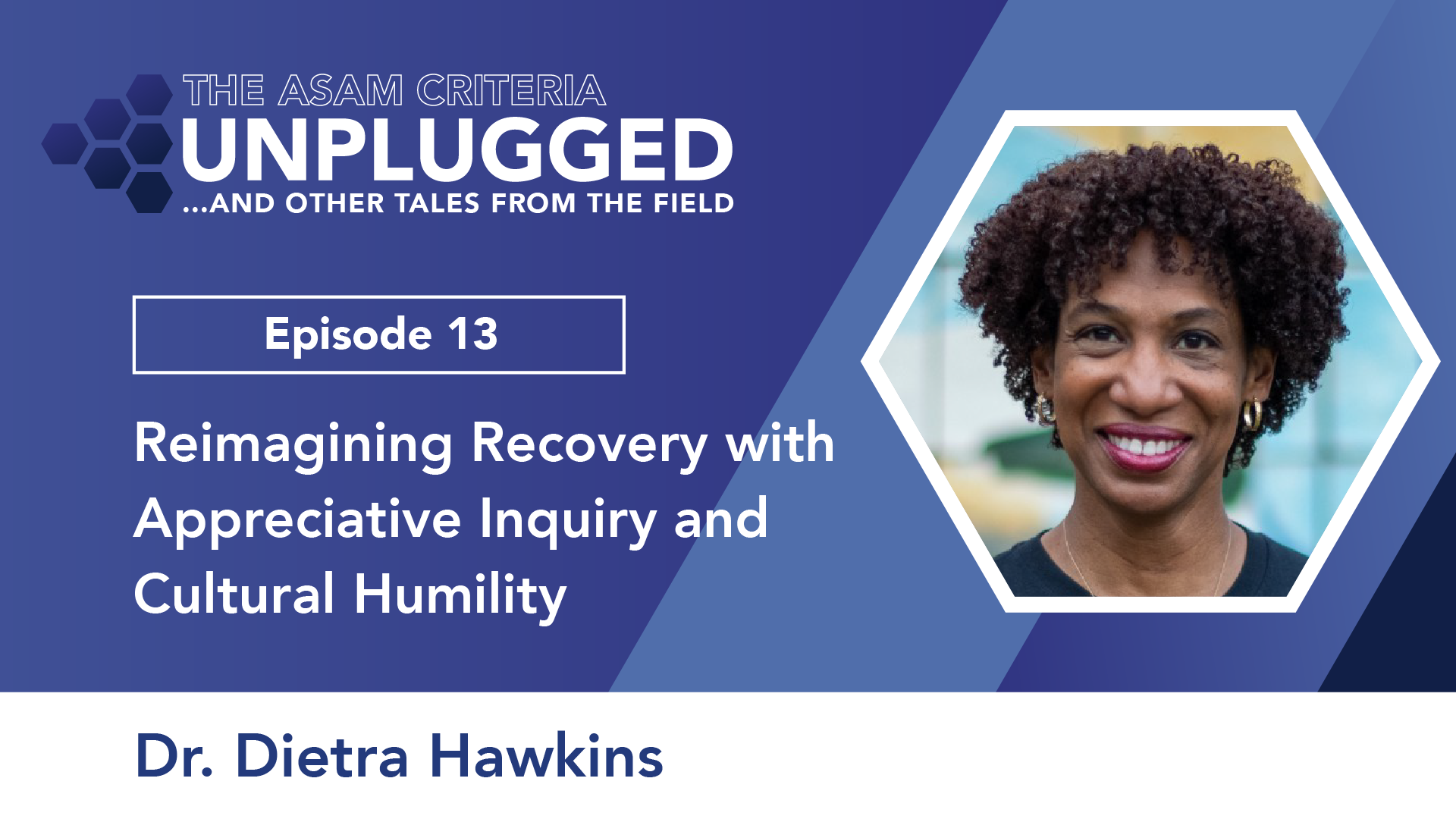Focusing on strengths rather than deficits: Appreciative inquiry and cultural humility in treatment

In our recent ASAM Unplugged webinar, hosted by Train for Change, Dr. Dietra Hawkins, licensed clinical psychologist, executive coach and founder of Both And Partners, shared her insights on reimagining recovery through the lens of appreciative inquiry and cultural humility.
What is appreciative inquiry (AI)?
Traditionally, treatment often begins with a problem-solving approach: “Let’s fix your problem behaviors.” Dr. Dietra Hawkins, “Dr. Dietra,” suggests reimagining the approach with appreciative inquiry (AI). Instead of asking “what’s gone wrong,” AI flips the script and starts with questions like:
-
What’s working?
-
What could be better?
-
What gives us hope and energy to keep going?
This shift generates engagement and allows individuals and organizations to focus on strengths rather than deficits. As Dr. Dietra notes, “When we ask different questions, we spark new energy. People lean in because we are not assuming something is wrong with them — we are inviting them to tell a story about what’s right.”
“You still gather all the necessary information,” she said, “but by reordering the conversation, you invite hope and trust.” Dr. Dietra also points out that anyone, regardless of role, can apply this lens.
For leaders and practitioners eager to apply AI, Dr. Dietra emphasizes starting internally before rolling out client-facing changes. Staff can begin by reflecting together on questions like:
-
What do we as an organization do well?
-
What makes us able to do this well?
-
How can we build on those strengths in new areas?
One agency reimagined its missed appointment notifications. Instead of sending formal discharge warnings, they mailed greeting cards — leading to higher reengagement. Small shifts in tone, inspired by appreciative inquiry, created a ripple effect across the organization.
For leaders, appreciative inquiry also means going beyond survey feedback to elicit stories. Dr. Dietra suggests questions like:
-
What do you love about your job?
-
If you could envision change in the next two years, what would that look like?
-
What’s one thing I could do to make your life better in the next month?
The key, she emphasizes, is to listen without defensiveness. It is helpful for leaders to resist the urge to explain away barriers and instead engage in “cross-dialogue,” where all perspectives — leaders, staff, clients and families — are given an equitable voice. Done well, this approach builds generative energy that sustains momentum and prevents burnout.
Social determinants of health: Looking upstream
Recovery is shaped not only by treatment but also by housing, transportation, discrimination and community conditions. Dr. Dietra encourages providers to look upstream, acknowledge systemic barriers and partner with other sectors.
For instance, one agency discovered attendance gaps weren’t due to client disengagement but to harassment on a bus line at a certain time of day. By listening to clients and reaching out to transportation systems, they addressed a barrier that might otherwise have been misinterpreted as noncompliance.
Practicing cultural humility
Cultural humility is an ongoing practice rooted in self-reflection, awareness of power and partnership. Dr. Dietra describes three dynamics of power:
-
Power over – Dominance and control
-
Power with – Shared partnership
-
Power to – Empowering and coaching
The goal is to emphasize “power with” and “power to.” Practically, cultural humility shows up in small choices: asking people how they identify rather than assuming, acknowledging systemic discrimination where it shapes a client’s story, and being curious rather than judgmental.
Dr. Dietra reminds us that curiosity requires energy. Practices like reading diverse fiction, engaging in cultural experiences outside one’s comfort zone and taking adequate rest can help providers remain open to perspectives beyond their own. Self-care plays too important a role in care providing to be overlooked.
Applications in justice settings
For practitioners working in justice systems, Dr. Dietra underscores the importance of grace and realism. The system can be restrictive, and staff often face expectations beyond their training. AI can provide balance, encouraging curiosity and collaboration without denying difficult truths.
She cautions against the misconception that appreciative approaches are “too soft.” Instead, they create space for courageous conversations where truth and accountability are paired with empathy and possibility.
Where to start
For those ready to try appreciative inquiry, Dr. Dietra recommends beginning small:
-
Open staff meetings with a five-minute storytelling exercise about what “lit you up” recently.
-
Journal with prompts like: What do I love? What opportunities do I have? Who are my key relationships? What might get in the way?
-
Reframe engagement strategies to highlight care and strengths.
-
Ask “why” five times to deepen conversations without defaulting to quick fixes.
She also recommends The Thin Book of Appreciative Inquiry as an accessible starting resource, along with AI Commons for free tools and materials.
By asking better questions, listening deeply and valuing every voice, we can transform treatment systems into spaces of healing, belonging and generative energy.
As Dr. Dietra notes, “If the majority of people in an organization feel their values are in alignment with the work they do, then everyone is winning. Appreciative inquiry helps us get there — and it helps us avoid burnout along the way.”



